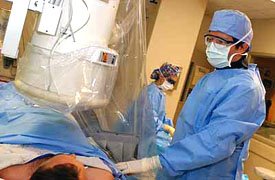“Do you need a stent?”
Sad to say, but that sentence condenses the wisdom of over 90% of practicing cardiologists.
Prevention of heart disease means take Lipitor or some other statin and cutting the saturated fat in your diet. That’s it. Maybe throw in exercise.
Regression of coronary plaque? That phrase has only entered the conversation since the AstraZeneca-supported trial of Crestor succeeded in achieving 8% regression of plaque (Track Your Plaque Members: See News) as demonstrated by intracoronary ultrasound.

In other words, in the minds of my colleagues, it can’t be true until a drug company tells them it’s true. It’s beyond me why this brainwashing of otherwise intelligent people has occurred, but it is blatantly evident in practice.
Fish oil is another example. The spectacular benefits of fish oil have been known for 20 years. But only recently has it become a “mainstream” practice to recommend fish oil, largely because a drug manufacturer has put a preparation through the rigors of FDA approval (Omacor) and is now marketing directly to physicians. All of a sudden, fish oil is a good thing? No, it’s just achieved legitimacy in the eyes of practitioners because it graces marketing literature.
If you’re reading this, you’re likely interested in coronary plaque regression using the only tool available for you to measure, track, and regress coronary plaque: CT heart scans. Intracoronary ultrasound will achieve the same goal, but it is an invasive procedure performed at heart catheterization, involves threading a wire and imaging probe all the way down the artery, involves real risk of tearing the inner lining of the artery, and is costly (around $14,000-$20,000 for the entire package). Do it every year? That’d be nuts.
If you’re thinking about coronary plaque regression, using fish oil, concerned about patterns like low HDL and small LDL, aware of the vitamin D deficiency issue as a coronary risk factor, etc., you are far more aware than the vast majority of practicing cardiologists. They are interested in what new brand of anti-coagulant to use during their heart catheterization (because the product representative gushes about the new agent—only $1200 a dose!). Or, they are interested in gaining the procedural skills to put in a new device like a biventricular pacemaker. Regress/reverse coronary plaque? What for?
You already know that a conversation about coronary plaque reversal will not be obtained in your cardiologist’s office. Your family practice doctor or internist? Fat chance! Knee arthritis, pap smears, pneumovax inoculations, sore throats, gout, back pain—they’re spread far too thin to know anything more than the most superficial amount about coronary plaque control. Most know nothing.
That’s where we come in. That’s our mission: Educate people about the extraordinary tools that you have available to you, all in the cause of control or reversal of coronary plaque.